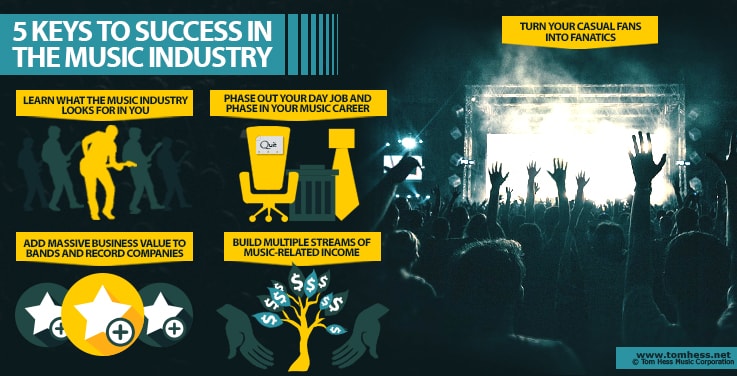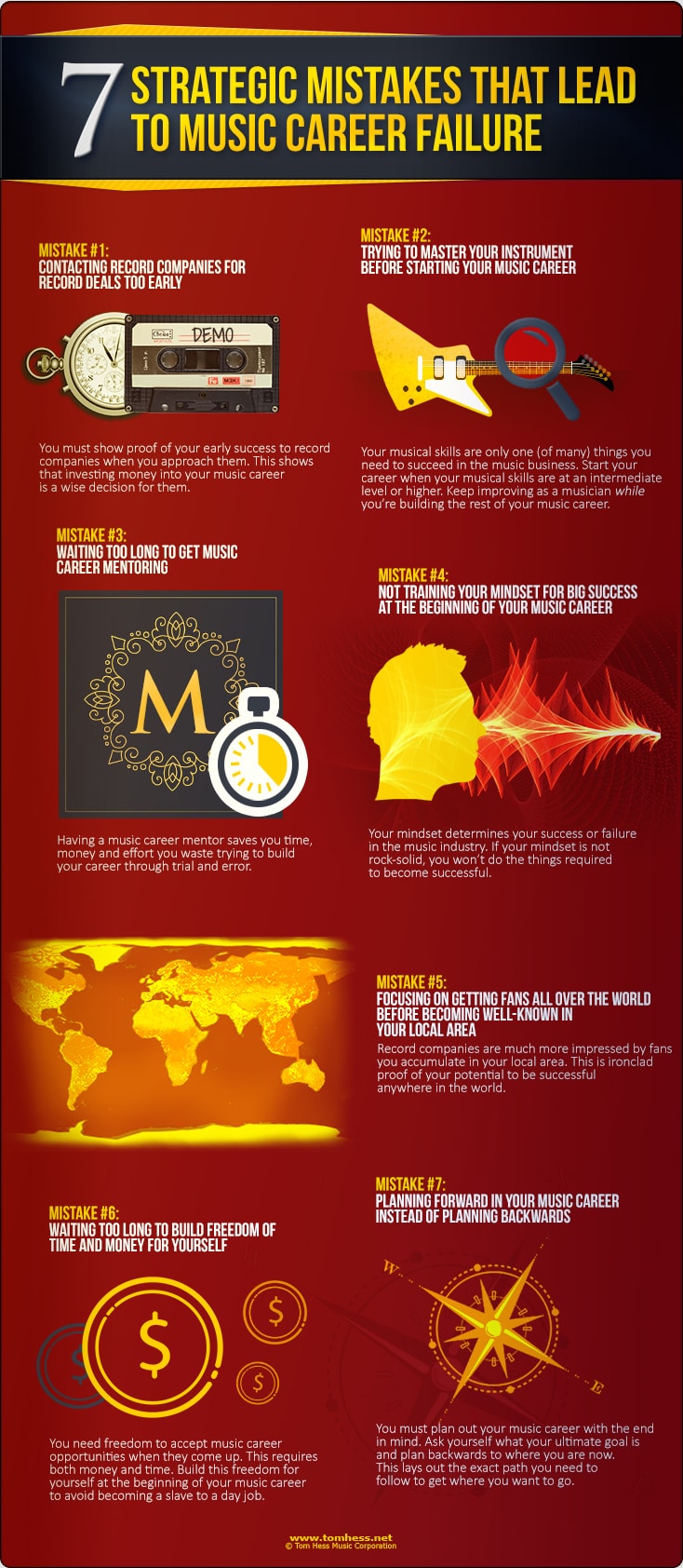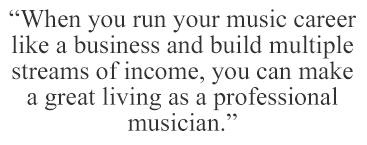5 Questions You Should Be Asking If You Are Serious About Building A Successful Music Career
by Tom Hess
Music Instead Of
Downloading It
Illegally

EMAIL TO GET ACCESS
By submitting your info, you agree to send it to Tom Hess Music Corporation who will process and use it according to their privacy policy.
As you build your career in the music industry ...
... you are going to have a lot of questions about how the music business works.
The most important place to begin is ...
... to ask the right questions.
When you ask the right questions, your chances of making it in music go WAY up.
(And so do living the life you've always dreamed about.)
Music Instead Of
Downloading It
Illegally

EMAIL TO GET ACCESS
By submitting your info, you agree to send it to Tom Hess Music Corporation who will process and use it according to their privacy policy.
Below are the most important questions about the music industry that most musicians never ask.
Study them (along with my comments on why each question is important).
And most imprtantly...
... build your music career (and overcome your music career challenges) based on these philosophies
When you do...
... you'll have a deeper understanding of what it takes to succeed in the music industry than most musicians in the world.
Let's roll:
Most musicians assume that record companies and bands only work with musicians who:
- Are extremely talented (as musicians, songwriters and performers)
- Happen to be at the right place at the right time. This means they made the perfect connection with someone in the music industry who saw something special in them and gave them a big opportunity that other musicians weren't lucky enough to get.
This is not true. Of course record companies do expect you to have good musical skills, but your musical skills are not enough to make you successful.

No matter how good your skills are, there are thousands of musicians who are just as good (or better) than you on your instrument.
To stand out, you also need the right mindset, personality, attitude and ability to add value in other ways.
When you know what those things are and take action to develop them, making it in music becomes easy.
This video explains in detail the things that record companies and bands look for in you:
Question: “Tom Hess, what does it mean to “add value in other ways besides playing my instrument”?”
Answer: It means to help the companies you work with make more money (which is their primary goal). Playing your instrument really well is only one way to do that. Other ways to add value include:
- Having great songwriting skills, so that you can write music faster and consistently release new material.
- Having excellent stage presence and live show that your fans enjoy (so they keep coming to see your gigs).
- Understanding the music business, marketing, sales, communication, copywriting, management, promotion and negotiation.
- Having a database of music fans who already know, like & trust you. This helps you promote your shows to your existing fans and dramatically increase your album (and merchandise) sales.
- Having the ambition and work ethic to do things above and beyond what you are expected to do.
Most people are so fearful of going broke in the music industry that their fear prevents them from even trying to earn big money in their music careers. The music business is a very stable and lucrative industry to be in… yet most musicians struggle to earn a great living, because:
- They assume that all musicians are destined to struggle with money. This mindset kills all ambition for you to become financially successful. Think about it: how hard would you try to succeed at something if you knew that you were destined to fail? Other musicians are no different from you.
- They look for a job in the music industry instead of thinking about themselves as entrepreneurs in music.
- They don’t develop multiple streams of music-related income, which are:
 15 Tips To Grow Your Music Career
15 Tips To Grow Your Music CareerGet free music career tips on how
to succeed in the music industry.
 What The Music Industry Looks For
What The Music Industry Looks ForTake this test to see how much you
know on how the music biz works.
 Build A Music Career Success Plan
Build A Music Career Success PlanHow to get the perfect blueprint to build your music career dreams.
- Independent - if something was to happen to one of your income streams, your other sources of income continue to support you financially.
- Congruent - all of your income streams must be aligned with your primary goal(s) in the music industry.
- Residual - your income streams must pay you over and over again (ideally forever).
- Passive - your income streams should generate money continuously after the work is done.
When you run your music career like a business and build multiple streams of income, earning 6-figures (or more) per year as a musician becomes a very realistic goal.
Most musicians want to know “how to get more fans?”, but don't realize that the total number of fans you have means very little if your fans are just casual fans. Casual fans may enjoy listening to your music, but have no real loyalty to you or your band.
Fanatical fans buy all your albums, wear your band’s t-shirts, come to your every show and (in some extreme cases) get tattoos of your band’s logo on their bodies. Guess which group helps your music career grow a lot faster? :)
When you have a loyal following of fanatical fans, not only do they actively support your music career, but they also spread the word about you and your music - helping you build your overall fan base much faster.
Want to learn how to turn your fans into fanatics and get them to come to your every show? Download this free music career eGuide & learn how to make a great living as a performing musician.

Most musicians are told by friends and family that they need to have a backup plan as they enter the music business. This advice almost always comes from good intentions, but it hurts your chances of making it in music.
Musicians who listen to this advice become trapped at their non-music related day jobs and are unable to fully focus on their music careers. Months, years and decades go by, and their music career dreams remain unrealized… sad, but true.
Fortunately, it is possible for anyone (and for you) to transition from a day job into a successful music career. The first step towards this goal is to ask the right question that focus your mind on the result you want.
The second step is to learn how to increase your income as a musician and build an exit strategy for leaving your day job (replacing your job’s salary with music career income). Working with a music career mentor helps you reach this goal much faster.

Many people enter the music industry with an entitlement mindset, expecting to be given opportunities (a record deal, high-paying gigs, position in a touring band, etc.). Few people ever ask what they have to do to earn the best opportunities to grow their careers.
The secret to receiving the best music career opportunities is to add more business value (with the least amount of risk) to people and companies than anybody else will.
Think about getting gigs (a common challenge for many musicians & bands). Most musicians think only about what they want (a venue to perform in) and put zero thought into what booking agents (and venue owners) want (to drive more people into the venue). These musicians make the same mistakes over and over again in their approaches to getting gigs and miss opportunities that other bands easily get.
Now think about touring. Most bands (and musicians) would love for a record company to send them on tour. Few musicians do anything to earn this opportunity, such as:
- Improving your financial situation to show record companies that you don’t have financial pressures in your life.
- Working on your stage presence, to show record companies that they won’t need to invest thousands of dollars to coach you how to behave on stage before the tour.
When you do these things, it becomes easy to get the opportunities in your career that other musicians only dream about.
You now know some of the most important questions to ask yourself about growing your music career. The next step is to learn very specific actions you can take right now to increase your music career income, leave your day job and make a lot of money as a performing musician. Download this free music career eGuide & learn how to build a music career you can be proud of.
 About Tom Hess: Tom Hess is a guitar teacher, music career mentor and guitar teacher trainer. He trains musicians how to leave their day jobs and build successful fulltime careers in the music industry.
About Tom Hess: Tom Hess is a guitar teacher, music career mentor and guitar teacher trainer. He trains musicians how to leave their day jobs and build successful fulltime careers in the music industry.
Learn how to find work in the music business.

